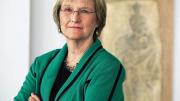Imagine some two hundred middle school students, their eyes wide with a blend of delight and awe, gazing up through the magnificent glass ceiling of the newly renovated Harvard Art Museums.
In April, I had the pleasure of witnessing that sight just before welcoming to the University five busloads of children from Mott Hall Bridges Academy, a school in Brooklyn’s poorest neighborhood. The students became something of an internet sensation earlier this year after one of their classmates appeared on the popular blog, Humans of New York, and expressed admiration for his principal and her high aspirations for her students. His response inspired the creator of the blog to launch a $100,000 online fundraising campaign to support a single class visit to Harvard. More than $1.4 million later, the effort far exceeded its goal, and we organized a day-long program for sixth, seventh, and eighth graders designed to help them understand that they can—and should—imagine themselves attending a place like Harvard.
In recent years, the University has been able to open its doors wider than ever, offering generous financial aid and welcoming extraordinary students no matter their circumstances. But the work of reaching bright and motivated would-be thinkers and doers begins much earlier. How can we help to create an environment in which young people are limited only by their own talent and work ethic? Harvard has been answering that question through a host of programs created to motivate and inspire students long before they ready themselves for the college application process.
Each year, all seventh graders in Cambridge public schools get a glimpse of college life when they select a short class focused on the arts, English literature, science, or social science as part of a program we created called Project Teach. More than 400 eighth graders tour laboratories, interact with graduate students and faculty, and present their own work as part of the annual Science and Engineering Showcase hosted by the Harvard School of Engineering and Applied Sciences. The Digital Literacy Project introduces middle and high school students in Boston to computer science during a ten-week course taught by Harvard undergraduates, a program that has reached more than 250 young people since it began two years ago.
Since its establishment in 2003, the Crimson Summer Academy has helped more than 300 high-achieving, low-income students from local high schools prepare for the transition to higher education. Selected during their freshman year, participants spend summers on Harvard’s campus immersed in a curriculum focused on citizenship and skill building, and are supported throughout the year by undergraduate mentors. Graduates of the program have gone on to attend more than 60 colleges and universities, and 95 percent of them have persisted and received their degrees. A far-reaching network of alumni—the oldest graduates of the programs are in their mid-20s—offers guidance and support long after students complete their studies.
No matter where in the world I find myself, I am always reminded that Harvard is a symbol of possibility, a place where people discover aspirations larger than themselves or what they might have imagined. Not long after I met the students from Mott Hall, I traveled to Chicago to address hundreds of alumni following a faculty panel on education and its impact on poverty and social mobility. The discussion underscored the power of research being undertaken at the Graduate School of Education and across the University—and the undeniable importance of education in enabling individuals to thrive. We ought to do everything we can to ensure that as many young people as possible can imagine their futures here or elsewhere, free to look up, look out, and realize their dreams.
Sincerely,
Drew Faust









